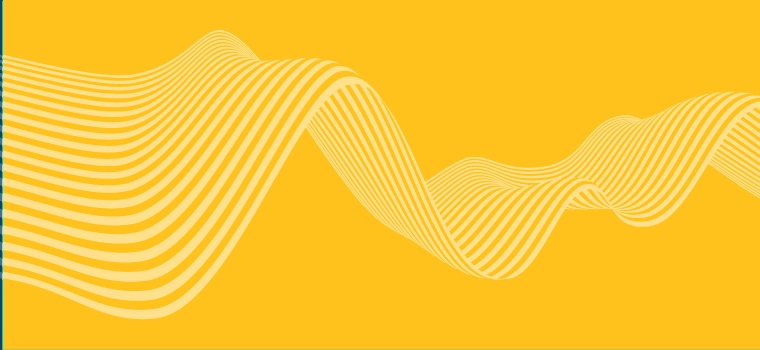
“I was able to find those areas in which I excel and which I wanted to experience further.”
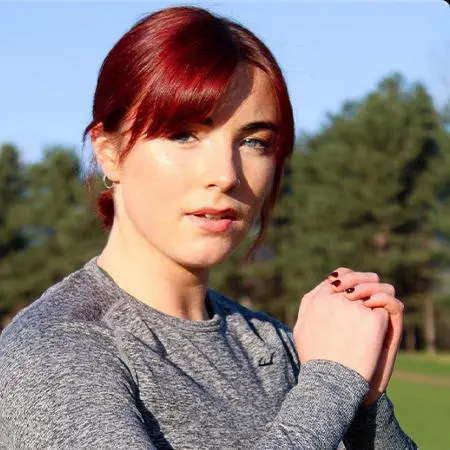
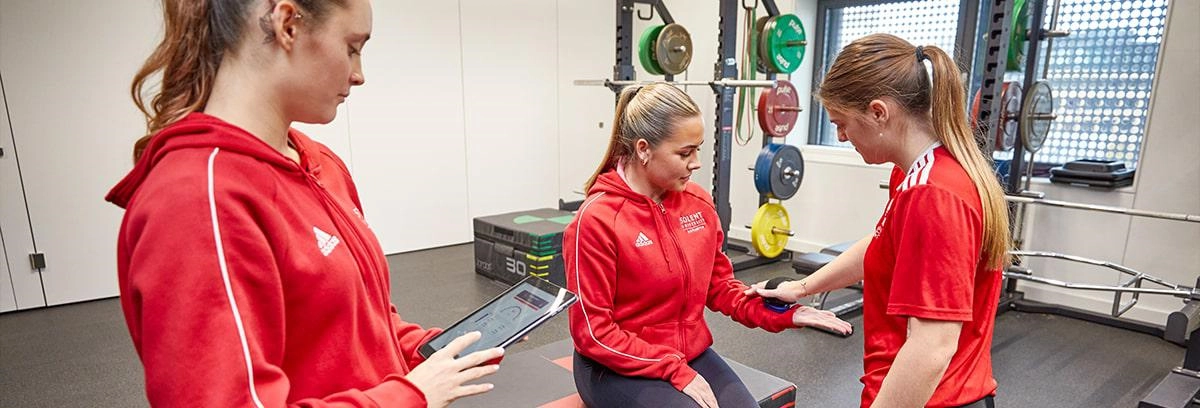
Follow your passions for sport and helping people reach their wellness goals. Our fantastic facilities and focus on practical experience will foster a rewarding career in a growing sector.
Contact international admissions
Email: Call:Whether your passion is in health and fitness, physiology and exercise science, nutrition or helping people overcome their health challenges, this course utilises Solent’s excellent reputation for its sport, health and fitness provision to prepare you for success. The growing jobs market offers a wide range of dynamic and rewarding career options and we’ve used our experience to offer two inspiring pathway options.
Fitness and personal training pathway:
The fitness and personal training pathway will prepare you for a wealth of advanced skills in clinical exercise physiology and rehabilitation, strength and conditioning, personal training, sports massage therapy, public health and nutrition to provide you with a wide range of career options. You may know what it is you want to do for a job, and that’s great, but if you’re not sure, this is the perfect course as you'll find your specific interests and strengths as you move through your studies.
We'll use our years of personal training experience to support you in building your business and entrepreneurial skills, so you’re fully prepared for a successful career in a competitive market.
Health and exercise science pathway:
The health and exercise science pathway prepares you for a range of careers in the health and well-being sector. If your passion is in nutrition, clinical exercise science or public health and psychology we have it all here for you. Graduates from this pathway have gone on to have successful and rewarding careers as nutritionists, exercise rehabilitation specialists, dieticians, physiotherapists*, public health practitioners and NHS health and well-being advisors.
*This course will qualify you for postgraduate study in physiotherapy and dietetics.
Our staff have a special blend of academic excellence and industry experience which brings great creativity. We’ve a wealth of in-house health and wellbeing initiatives for you to get involved with including a personal training scheme, strength and conditioning academy, exercise rehabilitation clinic and nutrition counselling service, so you can gain all the real world learning you need or plan your research in a real-world context without even leaving campus. There are also plenty of external partnerships available if you do want to go out on placement.
The course is fully endorsed by the Chartered Institute for the Management of Sport and Physical Activity (CIMSPA) for three CIMSPA competencies - Gym Instruction (after the first year), Personal Training, and Working with Referred Populations (after the second year) - allowing students access to the CIMSPA register. Students will also gain CIMPSA recognition for Cancer Rehabilitation (after the third year).
Solent is renowned for its focus on employability enhancement and links with professional associations. This course has extra professional qualifications available to enhance your skills and employability:
If you’re looking to study our fitness, health, nutrition and exercise degree but don’t have the relevant qualifications or experience, the sport foundation year will help you develop the core skills and knowledge to progress. Find out more about the sport foundation year.
This course also offers the option of a placement year. A placement year allows you to put what you've learned in your first and second years into practice in the workplace, gaining valuable real-world work experience before you graduate. Our course and placements teams will help you find the perfect industry placement in your chosen field.
Endorsed by:

Active iQ
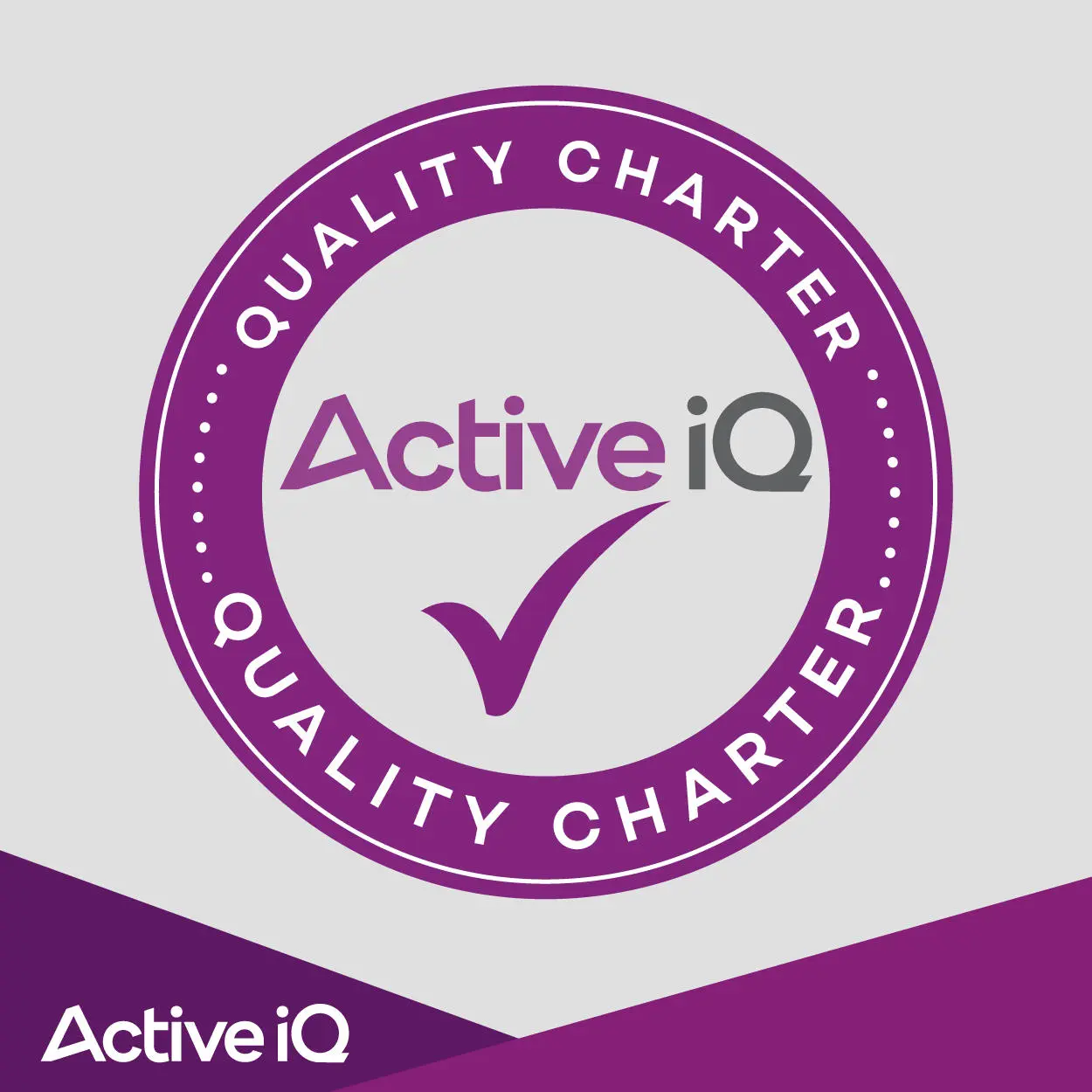
This course is ideal for anyone with a passion for helping individuals achieve their health, nutrition or fitness goals. Perfect for school-leavers, mature students and international applicants. This course offers you the opportunity to make a real difference to the health and well-being of your nation in a growing and exciting jobs market.
The skills you’ll develop on this course open up a wide range of career opportunities. Graduates have a wealth of career options to choose from.
The two pathways of this course mean you can be ready for employment in many roles in different healthcare sectors, or you will be perfectly placed to pursue higher-level study in a variety of disciplines.
Health and Exercise Science Pathway – career opportunities:
Fitness and Personal Training Pathway – career opportunities:
The course allows you access to postgraduate study in nutrition, where you can gain fully accredited status to the AfN, as well as many other postgraduate courses in physiotherapy, dietetics, and public health.
Hear from Solent alumni about where their careers have taken them and how studying at Solent prepared them for their future.
Read more stories
“I was able to find those areas in which I excel and which I wanted to experience further.”

Staff bring a unique blend of academic excellence and research informed teaching with substantial industry experience to ensure you’re work ready, world ready and future ready.
The University cannot guarantee any particular members of staff will teach specific aspects of the course in the future, but will endeavour to ensure the teaching team maintains their balance of experience and qualifications.
Throughout your studies you'll have the opportunity to use a range of high-quality facilities including the sports complex which features teaching gyms and is where all fitness qualifications and the majority of your real-world learning experiences take place. You'll also use the physiology lab where you'll learn and experience first-hand the scientific equipment used to monitor and enhance human health and performance.
Our vibrant campus brings state-of-the-art facilities to enhance your learning and elevate your student experience. Our award-winning teaching building, The Spark is centred around students and offers a stimulating study environment with flexible learning spaces. Away from studying, why not try out the gyms, fitness studios and sports halls in our £28 million Sports Complex, or watch a blockbuster film at our student-run cinema with Dolby Atmos audio.
Broaden your horizons by adding an international dimension to your CV – essential to achieving success in today’s fast-changing, global environment.
Studying, working or volunteering in another country could be the experience of a lifetime. Enhance your degree by developing important global skills such as knowledge of other countries, language skills, intercultural awareness, adaptability and confidence.
For more information, please email international.mobility@solent.ac.uk.
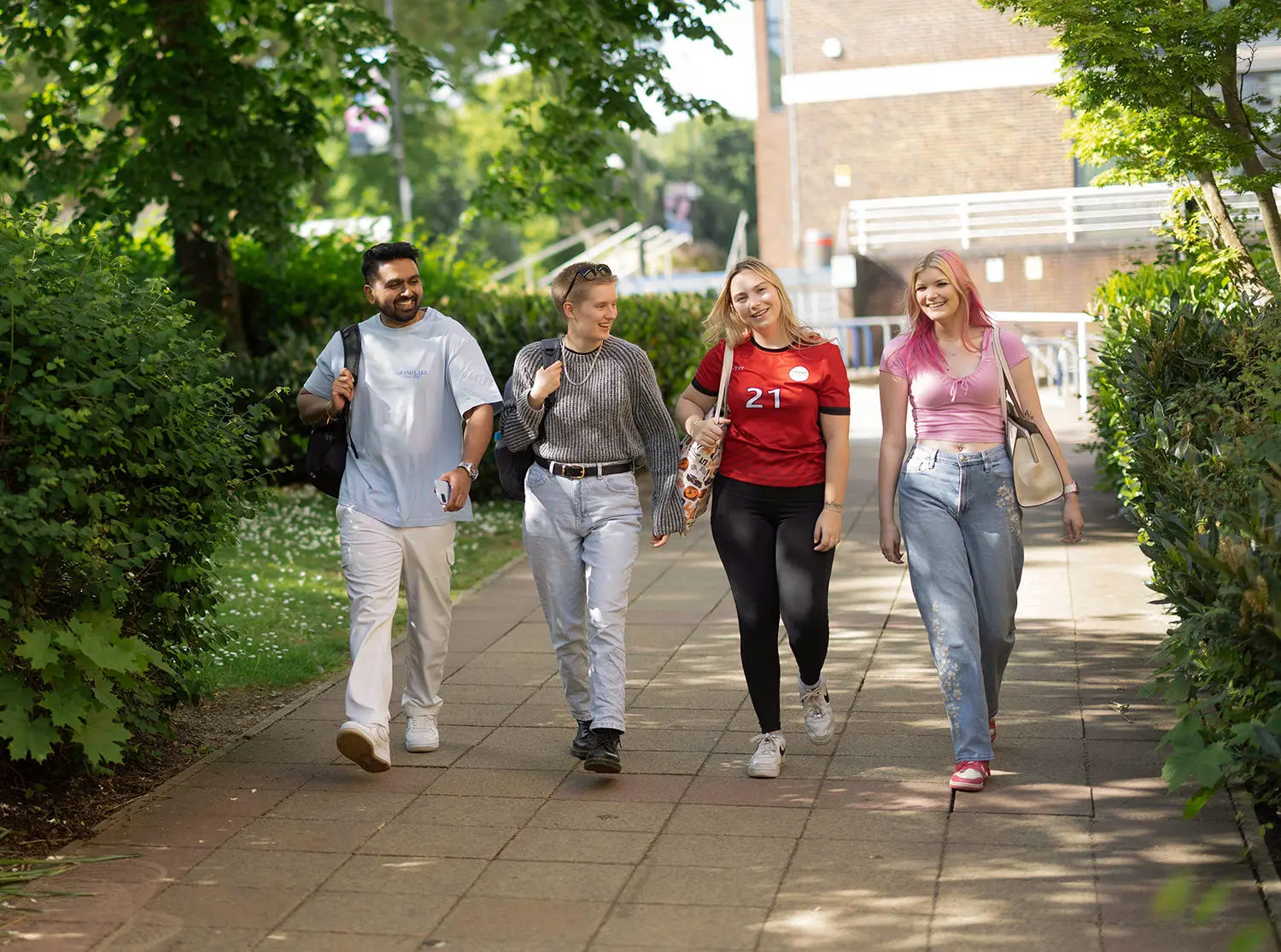
During this module you will learn about key definitions, theories and concepts of leadership including: leadership styles, theories of learning, becoming a leader, creating an environment, reflective practice, leading individuals and teams, how to develop athletes and safe and inclusive practice.
In addition to learning the theories that underpin the subject of fitness in sport, you will engage with various topics and learning styles and opportunities.
This module will introduce you to the wider sport, health and football industry and enable you to focus on the environments that relate more closely to your chosen degree in sport, health, or football.
Studying this module will provide you with a broad overview of the sport business and will enable you to develop subject-specific knowledge in several key areas such as operations, management, finance and marketing.
The module will focus on the personal and professional development opportunities available to enhance the key attributes that employers demand, covering both customer-facing and business-facing experiences.
In this module will focus on the contemporary issues in sport. Teaching and learning will be led by issues highlighted in the academic arena, trade press and general media.
Providing you with the technical knowhow, practical expertise and the latest industry research, this module is the perfect start on your way to a career in health and fitness. It provides an essential basis for you to become a qualified fitness professional where you will develop your ability to plan and deliver safe and effective gym sessions.
The module introduces you to the anatomical and physiological principles of the human body and how they enable exercise to be undertaken. In addition, you will investigate scientific principles of human movement.
In this module you will learn why the places where people are born, grow, live, work and age impact health and create significant and unfair differences in health outcomes. We will ask how can we ‘create’ health and would a fairer society improve the health of the population?
On this module you’ll learn about the link between nutrition and health and exercise, how to analyse a diet, and make healthy-eating recommendations. On successful completion of this module, you will receive an Association for Nutrition (AfN) Certificate in Intermediate Nutrition Essentials for Fitness and Leisure. (Please note, this is a certificate of completion of the module and does not qualify students for certified AfN status, nor does it enable students to join the register as an ANutr)
Have you ever wondered why, when faced with similar psychological challenges and stressors, some individuals seem to remain well and thrive, whilst others become sick and vulnerable to poor health, illness and disease? This exciting module will examine the stress-illness/health link and you will work towards answering the fundamental questions surrounding why we get sick, what makes us healthy and what we can do about it.
You will learn how to investigate discipline specific problems or issues using both quantitative and qualitative methods of inquiry. Leading into your final year Project, you will begin to form your research idea or work placement.
This module will allow you to explore the numerous and complex factors that can cause obesity. You will learn how to measure body composition and dietary intake in order to calculate individualised energy and dietary needs with the aim of supporting clients with their weight loss and food choices. This module also includes training in Motivational Interviewing.
Graduate personal trainers, exercise rehabilitation practitioners, and industry experts often discuss the latest research; commonly the differences in physiological responses following testing and training methods. This module will study exercise science techniques such as strength testing (isometric, isokinetic and isoinertial), muscle mass measures (ultrasound), aerobic fitness (VO2 max/peak), electromyography, and electrocardiography.
With the increase in the availability of an almost endless range of training methods this module will provide you with the knowledge and practical skills required to design and deliver a bespoke evidence-based personal training programme to clients with a range of exercise goals. You will have the opportunity to gain a Diploma in Personal Training.
This module will provide you with the knowledge and practical skills required to carry out effective client-focussed soft tissue treatments to enhance performance and aid recovery from injury. You will gain practical hands-on experience of preparing, performing and evaluating soft tissue therapy treatments. Additionally, you have the opportunity to gain a Diploma in Sports Massage Therapy.
You will learn how to investigate discipline specific problems or issues using both quantitative and qualitative methods of inquiry. Leading into your final year Project, you will begin to form your research idea or work placement.
Please note: Not all optional modules are guaranteed to run each year.
This module is important because it addresses key skills and knowledge required for working in health promotion, exercise rehabilitation, and personal training. You will study the causes and pathophysiology of disease, how to risk assess referred patients, and how to plan and deliver exercise rehabilitation programmes, while working in our rehab clinic, and opting to gain an Exercise Referral Diploma along the way.
This module will teach you the fundamental knowledge and skills of developing key fitness characteristics of athletes in a variety of sports. Topics covered will include screening and monitoring athletes, developing strength, power, speed, agility, flexibility and mobility, energy systems conditioning, and how strength and conditioning is effectively integrated into an athlete’s programme.
This module will allow you to explore the numerous and complex factors that can cause obesity. You will learn how to measure body composition and dietary intake in order to calculate individualised energy and dietary needs with the aim of supporting clients with their weight loss and food choices. This module also includes training in Motivational Interviewing.
Graduate personal trainers, exercise rehabilitation practitioners, and industry experts often discuss the latest research; commonly the differences in physiological responses following testing and training methods. This module will study exercise science techniques such as strength testing (isometric, isokinetic and isoinertial), muscle mass measures (ultrasound), aerobic fitness (VO2 max/peak), electromyography, and electrocardiography.
This module will further develop your understanding around Health Promotion, that health is created in the places we live our daily lives, and that the places we are born, grow, live work and age, are the most influential factors on our health. In this module you will also design and deliver a Public Health project aimed to improve the health of the students and staff within the University.
This module is important because it addresses key skills and knowledge required for working in health promotion, exercise rehabilitation, and personal training. You will study the causes and pathophysiology of disease, how to risk assess referred patients, and how to plan and deliver exercise rehabilitation programmes, while working in our rehab clinic, and opting to gain an Exercise Referral Diploma along the way.
You will learn how to investigate discipline specific problems or issues using both quantitative and qualitative methods of inquiry. Leading into your final year Project, you will begin to form your research idea or work placement.
Please note: Not all optional modules are guaranteed to run each year.
With the increase in the availability of an almost endless range of training methods this module will provide you with the knowledge and practical skills required to design and deliver a bespoke evidence-based personal training programme to clients with a range of exercise goals. You will have the opportunity to gain a Diploma in Personal Training.
This module will provide you with the knowledge and practical skills required to carry out effective client-focussed soft tissue treatments to enhance performance and aid recovery from injury. You will gain practical hands-on experience of preparing, performing and evaluating soft tissue therapy treatments. Additionally, you have the opportunity to gain a Diploma in Sports Massage Therapy.
Between years two and three of your course, you'll be able to take a year out from studying to work within your chosen industry gaining valuable work experience. The course team and our careers service will help you with finding a placement.
The module serves to equip students with the skills and competencies to develop a personal training brand and business strategy in what is fast becoming a digital industry. Students will be expected to critically analyse current personal training business models to inform the development of their own personal training niche, brand and business. This module is essential if you are serious about being a PT and carries with it the Level 4 Diploma in Personal Training.
Understanding behaviour change is crucial if you are to be successful at supporting people to live healthier lifestyles. In this module you will learn about health behaviour change and approaches to understanding, predicting, and changing health behaviour. Do behaviour change interventions really work and, if they do, how can they be best implemented?
This module will provide you with an opportunity to gain experience of undertaking a degree-related individual project. The work will need to be underpinned by subject-specific research and theory, and will demonstrate how it is contributing to the existing body of knowledge relating to that area of interest. You can choose between a traditional Dissertation or carry out your research in the workplace and choose a Work Based Project.
Please note: Not all optional modules are guaranteed to run each year.
Developing on from your second year module you will form an appreciation for the role of an strength and conditioning coach whilst increasing your skills and confidence at delivering performance programmes for athletes. You can gain a level 4 Diploma in Strength and Conditioning and will put yourself in a strong position to move on to full UKSCA Accreditation.
This module will encourage you to analyse the way in which you assess and treat clients so that you are able to truly individualise your treatment plans to effectively address injury, tissue dysfunction and post injury complications. You will have the opportunity to gain a Level 4 Diploma in Soft Tissue Therapy.
Progressing from ‘Exercise Referral’ you will investigate further the science of long-term disease and disease management. You will investigate the theory and practice of exercise rehabilitation such as cardiac, stroke and cancer rehabilitation and you will hone your skills in our exercise labs with referred patients from local hospitals and charities. You can gain the CIMSPA L4 in Cancer Rehabilitation if you choose.
The importance of good nutrition and hydration for sport and exercise has grown in popularity. This module will enable you to understand the scientific theory of the field, combined with the practical expertise, to apply sports nutrition to improve performance in a wide variety of sporting and exercise disciplines.
This module will explore the role of diet and nutrition in supporting growth, development, and health throughout the lifecycle. You will learn the role of nutrition in the aetiology and prevention of nutrition-related disorders and chronic disease. The module highlights the potential influence of early diet and food choice on health throughout the lifespan.
Progressing from ‘Exercise Referral’ you will investigate further the science of long-term disease and disease management. You will investigate the theory and practice of exercise rehabilitation such as cardiac, stroke and cancer rehabilitation and you will hone your skills in our exercise labs with referred patients from local hospitals and charities. You can gain the CIMSPA L4 in Cancer Rehabilitation if you choose.
This module will explore the role of diet and nutrition in supporting growth, development, and health throughout the lifecycle. You will learn the role of nutrition in the aetiology and prevention of nutrition-related disorders and chronic disease. The module highlights the potential influence of early diet and food choice on health throughout the lifespan.
This module explores contemporary health issues that face society at a time of increased geo-political turbulence, widening inequality and recovery from a global Pandemic. We will ask the question, is Public Health able to address the underlying causes of an ageing population, rising levels of obesity and loss of wellbeing?
This module will provide you with an opportunity to gain experience of undertaking a degree-related individual project. The work will need to be underpinned by subject-specific research and theory, and will demonstrate how it is contributing to the existing body of knowledge relating to that area of interest. You can choose between a traditional Dissertation or carry out your research in the workplace and choose a Work Based Project.
Please note: Not all optional modules are guaranteed to run each year.
This module will encourage you to analyse the way in which you assess and treat clients so that you are able to truly individualise your treatment plans to effectively address injury, tissue dysfunction and post injury complications. You will have the opportunity to gain a Level 4 Diploma in Soft Tissue Therapy.
Understanding behaviour change is crucial if you are to be successful at supporting people to live healthier lifestyles. In this module you will learn about health behaviour change and approaches to understanding, predicting, and changing health behaviour. Do behaviour change interventions really work and, if they do, how can they be best implemented?
The importance of good nutrition and hydration for sport and exercise has grown in popularity. This module will enable you to understand the scientific theory of the field, combined with the practical expertise, to apply sports nutrition to improve performance in a wide variety of sporting and exercise disciplines.
Contact international admissions
Email: Call:Solent’s curriculum framework builds on our unique, creative and applied approach to teaching. The transformation of students’ lives is at the heart of our mission as a university, and our curriculum – informed by the latest theory – reflects this shared educational vision.
Find out more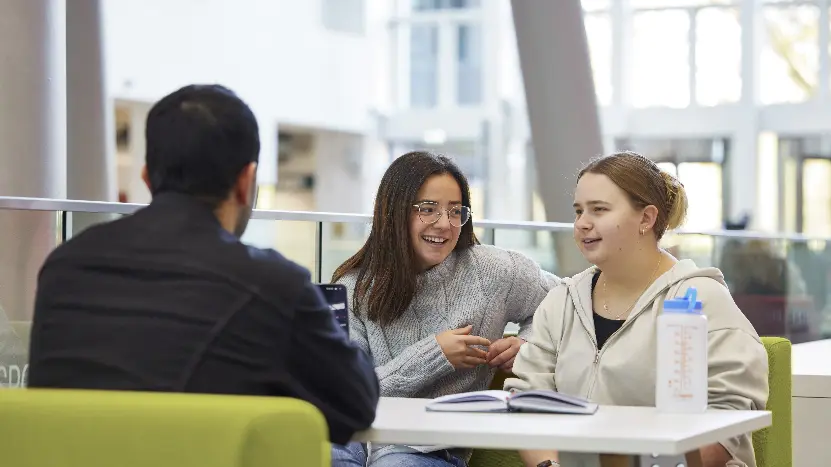
The student achievement team are on hand to help you succeed during your studies at Solent. They aim to contact you at key times during your time here with personalised information, advice and guidance, by email or phone.
The disability advice team provides information, advice and guidance for disabled students.
All students can access Succeed@Solent, Solent's online guide to getting better grades. It offers extensive, practical information and advice on topics such as academic writing, research and presentations.
The role exercise and nutrition plays in healthy ageing and disease reduction has become a focus for national health policy in recent times. Government and NHS policy is shifting toward 'social prescribing', which research has shown to often be more effective at lifestyle-related disease control than drugs.
This has led to increased demand for practitioners skilled in clinical exercise rehabilitation, health nutrition and behaviour change psychology.
A recent survey conducted with employers of the health and fitness industry identified that current training is insufficient and lacks proper insight into medical conditions, nutrition and psychology. Training should also offer students access to real-life patients/clients. Our BSc (Hons) Health, Nutrition and Exercise Science course responds to both the results of this survey and to the increasing need for suitably trained individuals in the health and well-being sector.
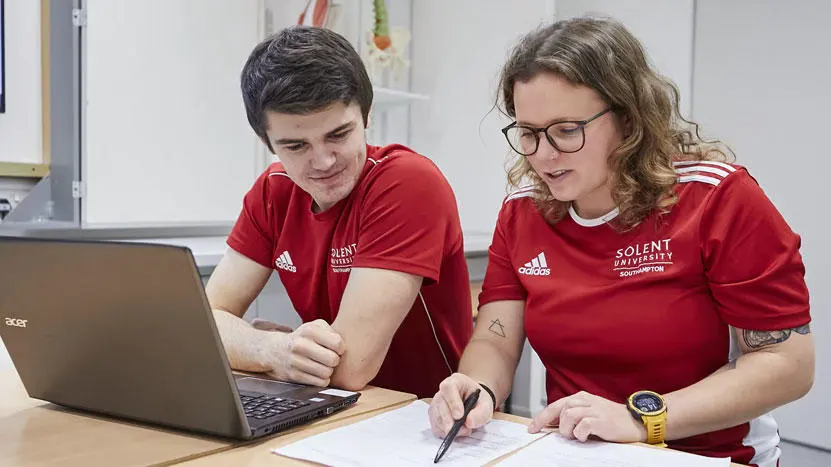
Starting salary: £15,000 to £24,000
This is for those employed by a gym or similar - salaries could rise to £35,000. Freelance instructors could earn between £20 and £40 per hour.
Salary range: £18,000 to £35,000
For exercise physiologists working in the sports sector. Clinical exercise physiologists working in the NHS would typically start at the lower end of the Band 5 (£27,055 to £32,934) and will need to gain a considerable amount of experience to progress up the pay scale.
Starting salary (public sector): £22,000 to £28,000
Private sector starting salaries can range between £23,000 and £30,000.
The stated salaries are published on prospects.ac.uk. Income figures are intended as a guide only.
Hear from Solent alumni about where their careers have taken them and how studying at Solent prepared them for their future.
Read more stories
“I was able to find those areas in which I excel and which I wanted to experience further.”

The Solent Careers team is committed to getting students into great careers.
While you are studying, the team can help you with finding work experience or placements, link you with a mentor, check your CV, or offer one-to-one guidance.
We also have graduate job opportunities just for Solent graduates.

6th
UK uni for sustained employment
Longitudinal Educational Outcomes, 2022
Every student at Solent University will also have the option to study an additional Certificate in Practical Artificial Intelligence qualification alongside their course. Free of charge, the course ensures you'll be prepared for a fantastic and varied career after graduation.

Thinking about studying further than an undergraduate degree? Alumni can get 20% off their postgraduate study.
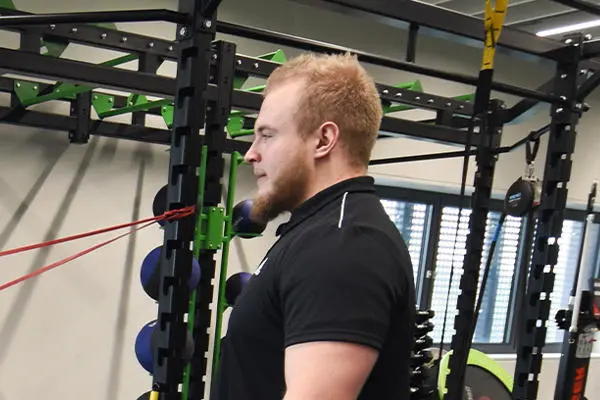
Explore the science behind physical health and exercise and the impact it has on individuals with clinical disease on this industry-led, practical course.
Find out moreThe tuition fees for the 2026/27 academic year are:
For further information, please visit our tuition fees page.
While most course costs are covered by your tuition fees, some essential resources and optional extras may need to be paid for separately. These additional costs are listed below. For advice on budgeting and managing your money, please contact student.funding@solent.ac.uk.
The 2026/27 additional costs are not yet available. For guidance, previous additional costs have been:
Compulsory costs
Optional costs
Solent University offers a range of bursaries and scholarships that provide financial assistance or waive fees for tuition or accommodation. Each bursary or scholarship has specific eligibility criteria. Check out our bursaries and scholarships pages to find out more.
Cost of living support
At Solent, we understand that the cost of living crisis may be of some concern. To help, we've put together some detailed information to show what support is available and how to make your money go further.
Graduation costs
There is no charge to attend graduation, but you will be required to pay for the rental of your academic gown (approximately £45 per graduate, depending on your award). You may also wish to purchase official photography packages, which range in price from £15 to £200+. Graduation is not compulsory, so if you prefer to have your award sent to you, there is no cost. Extra guest tickets will go on sale after results publication and will be sold on a first-come-first-served basis. The cost per ticket is currently £20. Please note, we do not guarantee there will be any extra tickets available to purchase.
Contact international admissions
Email: Call:Please select an option below:
As a general guide, we look for qualifications that are equivalent to the British high school A-levels.
If you are applying from outside the UK, find information about entry requirements, visas and agents for your country here.
For further information about EU qualifications, please see our course entry requirements document.
As a general guide, we look for qualifications that are equivalent to the British high school A-levels.
If you are applying from outside the UK, find information about entry requirements, visas and agents for your country here.
For further information about international qualifications, please see our course entry requirements document.
All international applicants need to be aware that the English language requirements to attend Solent University, and the English language requirements to obtain a visa from the Home Office, may be different. This means that if you meet the Solent University language requirement to gain a place on the course, you may still have to meet additional requirements to be granted with a visa by the Home Office.
We strongly advise all applicants to visit the Home Office website which outlines all the requirements for a successful visa application.
Full-time
Any student applying for the first year of a full-time/sandwich undergraduate course must apply through UCAS (University and Colleges Admissions Service). This includes mature, overseas and EU students.
Nearly all schools and colleges offer their students the facility of applying electronically through the UCAS website using 'Apply'; it may also be used by those applying independently in the UK and overseas. This facility and all course information can be found on the UCAS website: www.ucas.com.
Your application should reach UCAS by 14 January if you hope to enter a course the following autumn. Early application is advised for the most popular subject areas. Late applications may be made until the end of June. The UCAS Code for the University is S30, code name SOLNT.
Find out what happens after you apply
Contextual offers
Solent endeavours to offer learning opportunities to students from all backgrounds. When we receive and review an application, we take into consideration the context and personal circumstances of applicants when making a decision, which means our advertised entry tariff could be reduced.
Find out more about Solent's contextual offers
Applicants who do not have English as their first language will be required to demonstrate an approved level of proficiency in the use of the English language. The agreed minimum requirements for this course are:
TOEFL IBT tests taken prior to 21 January 2026
TOEFL IBT tests taken from 21 January 2026
Qualifications are checked before enrolment, and international students must bring their original certificates or certified copies when coming to study at the University.
Pre-Sessional English programme
The University also offers a pre-sessional English programme for international students who wish to improve their level of English before starting a degree course.
Contact international admissions
Email: Call: